

Truefood Network. In May of this year, molecular biologist Professor Jack Heinemann of the University of Canterbury (New Zealand), Dr Judy Carman, adjunct associate professor at Flinders University (Adelaide) and Sara Agapito-Tenfen (from Santa Catarina Unviersity in Brazil) published a study, which found that a form of genetic engineering called RNA Interference that silences or suppresses genes meant for target species, such as pests to aid in agriculture could, in fact, affect other organisms including people.They called for more rigorous testing as the current methods of safety assessment were proven to be insufficient according to their findings.
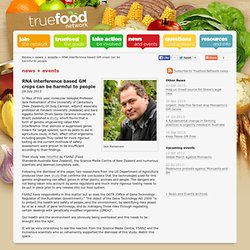
Their study was rebuffed by FSANZ (Food Standards Australia New Zealand), the Science Media Centre of New Zealand and numerous scientists and deemed completely safe. Our health and the environment are obviously being overlooked and this needs to be brought into the light. GMO feed turns pig stomachs to mush! Shocking photos reveal severe damage caused by GM soy and corn. (NaturalNews) If you have stomach problems or gastrointestinal problems, a new study led by Dr.
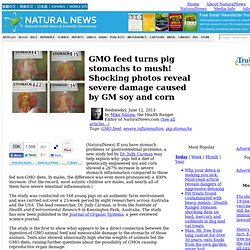
Judy Carman may help explain why: pigs fed a diet of genetically engineered soy and corn showed a 267% increase in severe stomach inflammation compared to those fed non-GMO diets. In males, the difference was even more pronounced: a 400% increase. (For the record, most autistic children are males, and nearly all of them have severe intestinal inflammation.) The study was conducted on 168 young pigs on an authentic farm environment and was carried out over a 23-week period by eight researchers across Australia and the USA. The lead researcher, Dr. The study is the first to show what appears to be a direct connection between the ingestion of GMO animal feed and measurable damage to the stomachs of those animals. Institute for Responsible Technology - GMO Education.
What is a GMO?
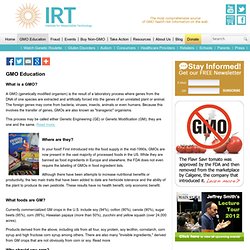
A GMO (genetically modified organism) is the result of a laboratory process where genes from the DNA of one species are extracted and artificially forced into the genes of an unrelated plant or animal. The foreign genes may come from bacteria, viruses, insects, animals or even humans. Because this involves the transfer of genes, GMOs are also known as "transgenic" organisms.
Infant Formula Manufacturers Refuse To Remove GMO And New Research Now Links Formula To Chronic Disease. June 14, 2013 by NATASHA LONGO.

Investigate the Effects of Genetically Modified Crops On Human Health. Target: United States Food and Drug Administration Goal: To prioritize research on genetically modified organisms and their effect on mammal reproductive systems and infertility.
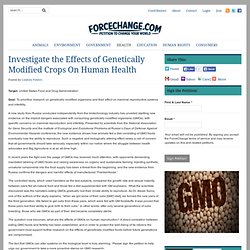
A new study from Russia conducted independently from the biotechnology industry has unveiled startling new evidence on the implicit dangers associated with consuming genetically modified organisms (GMOs), with specific concerns on mammal reproduction and infertility. Presented by scientists from the National Association for Gene Security and the Institute of Ecological and Evolutional Problems at Russia’s Days of Defense Against Environmental Hazards conference, the new evidence shows how animals fed a diet consisting of GMO foods eventually lose the ability to reproduce. Such a negative and biologically altering effect raises a call of concern that all governments should take seriously, especially within our nation where the struggle between health advocates and Big Agriculture is at an all-time high.
Sincerely, Scientists From Inside Monsanto, The Truth. GMO Plants establish in the wild. Genetically Modified Corn — Safe or Toxic? Pick up a box of cereal or other packaged food at the grocery store, and chances are you’re looking at a genetically modified product.

The Center for Food Safety, a nonprofit organization that seeks sustainable alternatives to harmful methods of food production technologies, estimates that more than 70 percent of the processed foods in U.S. grocery stores contain some genetically modified ingredients — mostly corn or soy. But, in most cases, these modified foods have received only limited testing. For example, take the three genetically modified corn varieties already being sold by Monsanto that are the subject of new analysis by French scientists. Two of the varieties have been genetically modified to contain unique proteins designed to kill insects that eat them, and the third variety was engineered to tolerate Roundup, Monsanto’s best-selling herbicide. Under current U.S. law, corporations are not required to make industry-conducted studies public. Confidential Science. Study Confirms Genetically Modified Crops Threaten Human Fertility and Health Safety.
Austrian Government Study Confirms Genetically Modified (GM) CropsThreaten Human Fertility and Health Safety Advocates Call for Immediate Ban of All GM Foods and GM Crops IMMEDIATE RELEASE (November 13, 2008) (Los Angeles, CA.) - A long-term feeding study commissioned by the Austrian Agency for Health and Food Safety, managed by the Austrian Federal Ministry of Health, Family and Youth, and carried out by Veterinary University Vienna, confirms genetically modified (GM) corn seriously affects reproductive health in mice.

Non-GMO advocates, who have warned about this infertility link along with other health risks, now seek an immediate ban of all GM foods and GM crops to protect the health of humankind and the fertility of women around the world. Feeding mice with genetically modified corn developed by the US-based Monsanto Corporation led to lower fertility and body weight, according to the study conducted by the University of Veterinary Medicine in Vienna. A book by author Jeffrey M. Mr. Health - Marion Nestle - Superweeds: A Long-Predicted Problem for GM Crops Has Arrived. After a decade of intensive genetically modified plant cultivation, weeds have emerged that are resistant to the most popular herbicide.

I was a member of the FDA Food Advisory Committee when the agency approved production of genetically modified foods in the early 1990s. At the time, critics repeatedly warned that widespread planting of GM crops modified to resist Monsanto's weed-killer, Roundup, were highly likely to select for "superweeds" that could withstand treatment with Roundup. Exposed: Biotech giant’s lies about the safety of GM corn. 2 July, 2012.

Genetically Modified Soy Linked to Sterility, Infant Mortality. "This study was just routine," said Russian biologist Alexey V.
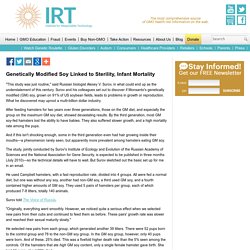
Surov, in what could end up as the understatement of this century. Surov and his colleagues set out to discover if Monsanto's genetically modified (GM) soy, grown on 91% of US soybean fields, leads to problems in growth or reproduction. What he discovered may uproot a multi-billion dollar industry. After feeding hamsters for two years over three generations, those on the GM diet, and especially the group on the maximum GM soy diet, showed devastating results. By the third generation, most GM soy-fed hamsters lost the ability to have babies.
Russian Biologists: GMO foods cause sterility in third generation. Editor's Note: From time to time we come across articles mentioning animal studies. We see these studies receiving attention in the media, and we see government bodies sometimes basing nutritional policy on such work, at least in part. Because this kind of information is being discussed in the public sphere, we bring it to our readers so you may be informed. But talking about animal research does not mean we endorse it. Genetic Engineers Explain Why GE Food Is Dangerous. Published: Sunday 24 June 2012 One of the report’s authors, Dr. Michael Antoniou of King’s College London School of Medicine in the UK, uses genetic engineering for medical applications but warns against its use in developing crops for human food and animal feed. Significant Health Hazards of Genetically Engineered Foods. By Dr. Mercola Scientists in Norway have released results from experimental feeding studies carried out over a 10-year period, and the verdict is in: If you want to avoid obesity, then avoid eating genetically engineered (GE) corn, corn-based products, and animals that are fed a diet of GE grain.
As reported by Cornucopia.org1, the project also looked at the effects on organ changes, and researchers found significant changes that affected weight gain, eating behaviors, and immune function. GMO, Global Alert. The GMO Threat [Full Length - HD] Groundbreaking New Study Links GMO to Leukemia: When Will Monsanto Stop Lying to Us? There are lots of ‘scientists,’ otherwise known as the academics on Monsanto’s payroll, who keep spouting the preposterous statement that there is no real science to back up the claims that GMO are bad for our health, but yet another study says otherwise. Recently published in the Journal of Hematology & Thromboembolic Diseases, the study underscores the potential ‘leukemogenic’ properties of the Bt toxin biopesticides used in almost all GMO foods that are currently planted on more than 3.9 million acres of crops in the US.
Many of these crops are shipped to other countries who have not yet banned GM foods from their imports, so the prevalence of their use on US soil affects the whole planet. Just a few months ago, references to GMO were made by scientists in France who conducted a study that pinpointed Monsanto’s genetically engineered corn, called NK603, as a major cancer-causing agent. Experts discuss the findings of the Roundup/GM cancer trial. GMO Health Risks - Sustainable Farming. From Earth Open Source July 2, 2012 More than 80 percent of corn grown in the United States has been genetically modified. Earth Open Source .
8106. Study Confirms Genetically Modified Crops Threaten Human Fertility and Health Safety. Comparing Vitamin, Mineral and Energy Content of GMO vs. Non-GMO. Higher antioxidant levels, lower pesticide loads, better farming practices all lead to a more nutritious end product when choosing organic over GMO foods. For example, tomatoes grown by organic methods contain more phenolic compounds than those grown using commercial standards. That study -- published in the Journal of Agricultural and Food Chemistry -- analysed the phenolic profiles of Daniela tomatoes grown either using 'conventional' or organic methods, finding that those grown under organic conditions contained significantly higher levels of phenolic compounds than those grown conventionally. Other findings published in the Journal of Agricultural and Food Chemistry showed that organically produced apples have a 15 percent higher antioxidant capacity than conventionally produced apples.
Farmer To Farmer: The Truth About GMO Crops (Documentary)